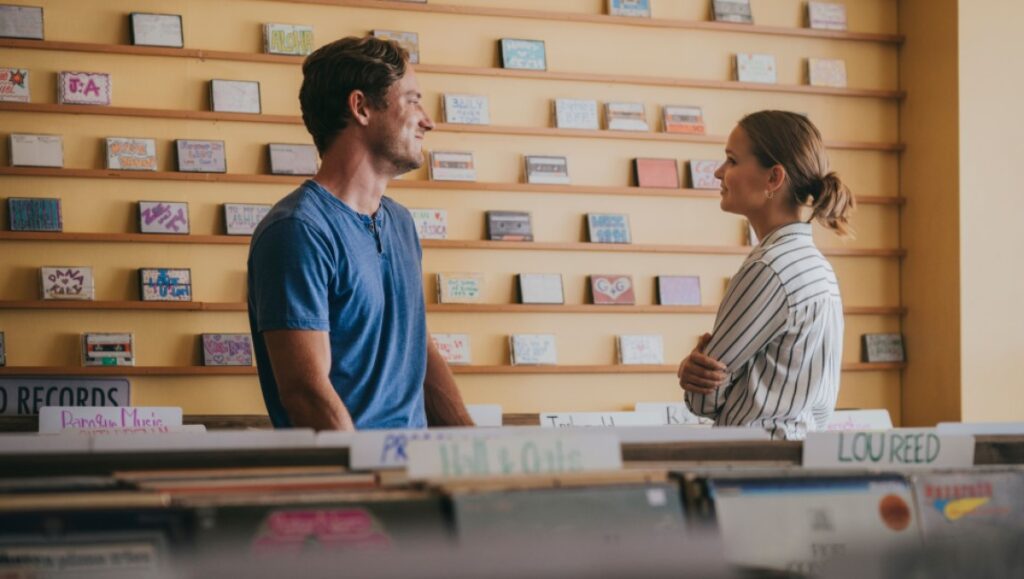Press Play‘s mash-up of The Time Machine and The Notebook is plagued by a wet blanket lead, horrid pacing, and a lack of any real romance.
Romantic drama Press Play inadvertently stumbled into a bit of good luck thanks to the two-year delay of monster blockbuster Top Gun: Maverick, which features leading man Lewis Pullman in the role of the dorky-but-loveable Lt. Robert Floyd, AKA Bob. Without his presence, it’s safe to assume that not a single person over the age of 12 would even give Press Play a passing glance, its story of eternal love through the lens of time travel so trite and banal that it could almost play as satire. Clara Rugaard stars as Laura, a twenty-something artist spending the summer in Hawaii with best friend Chloe (Lyrica Okano). At Chloe’s urging, Laura agrees to meet her friend’s stepbrother, the dorky-but-loveable Harrison (Pullman), who works at a local record store. Sparks instantly ignite, and it isn’t long before the two are inseparable, she showing off her paintings that register roughly at the level of airport terminal art, he explaining his love of vinyl and cassette tapes over digital streaming (“You have to flip it over. It’s interactive.” That no mention is even made of sound quality only proves the stupidity of Harrison’s hipster line of reasoning.)
Unfortunately, Harrison is soon killed in a freak accident, leaving Laura to abandon her love of painting insipid beach scenes and devoting all of her time to surfing, which her former paramour adored. Laura is so distraught that, even four years later, she is unable to maintain a steady relationship and shows up late to Chloe’s wedding, in which she is a bridesmaid. It’s at said wedding that Laura is given a special gift by Harrison’s former boss and friend, Cooper (Danny Glover?!): of course, it’s a mixtape that Harrison had made for her and which includes a handful of songs that played during key moments in their relationship. Strike that — the only moments in their relationship, because this film fast-forwards through their dating to a degree that makes it impossible to determine just how long they were together. (Were one to guess, it seemed to be somewhere in the ballpark of two weeks, which makes Laura’s proceeding withdrawal from life quite psychologically unsettling.) And so, Laura plays the mixtape, and wouldn’t you know it, she is literally transported back in time to these specific moments, getting another chance to experience love again. You see, music can be transportive, and in Press Play, that quality is literal!
But instead of savoring these times with her long-lost love, Laura becomes obsessed with trying to save Harrison, convincing him of her knowledge because she accurately predicts an earthquake they shared together. But Laura only has the timespan of a handful of songs in order to rescue Harrison, because the doofus only made a Side A, and the end of each tune transports her back to the present day, where she soon discovers her actions in the past have consequences, including her friend marrying a completely different guy who is quite possibly abusive. It takes Laura forever to figure out the film’s moral — that most people are only given one chance to experience love, and so she should appreciate these moments she has instead of, you know, scaring Harrison into believing that his every ensuing action will result in his death. As it turns out, saving Harrison isn’t as easy as it seems; almost as impossible as letting go of a loved one.
Press Play desperately wants to be the 21st century’s answer to The Time Machine by way of The Notebook — wait, wasn’t that The Time Traveler’s Wife? — but devotes only a handful of moments to the romance itself, rendering the proceedings completely without either heart or driving force. Laura is a wet blanket who sulks her way through the entire movie, while Pullman is asked to play merely confused for the majority of it, dampening his natural charisma in the process. Director/co-writer Greg Björkman certainly takes advantage of his breathtaking Hawaiian landscapes, but, unfortunately, the imagery is oftentimes so flat that it begins to resemble one of Laura’s bogus paintings, which theoretically could have been an intentional choice, but we have to hope not. And for a movie ostensibly driven by music, the song choices are thoroughly weak, a lot of shoegaze-y indie rock by the likes of Japanese Breakfast, Dayglow, and Slowdive that even Siri has a hard time recognizing. Obviously, these selections were certainly made according to budgetary concerns, but they’re nonetheless pretty symptomatic of everything wrong with Press Play, the type of film for which the Stop button was practically invented.
Published as part of Before We Vanish — June 2022.


Comments are closed.